





My Siblings: Understanding and Caring for Each Other
₹80
₹160
50% off
0 (0 ratings)
Grade Levels
Pre-K - Grade 2 (Ages 3-7)
Content Overview
Format: 1 PDF with 6 pages Features: Real images, first-person narrative, relatable sibling scenarios.
Pages from the Resource
This social story guides children in understanding and relating to their siblings. Through realistic images and simple language, it helps children explore themes of sibling relationships, sharing, and empathy in a way they can relate to.

Page 1

Page 2
What Users Say
0
0 ratings
5
0+
4
0+
3
0+
2
0+
1
0+
5 Stars
Product is Good to use.
10 months ago
Varsha Parent
Similar Products
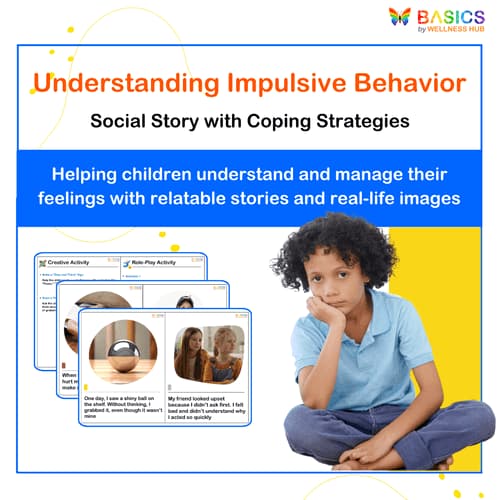
Understanding Impulsive Behavior: Social Story with Coping Strategies
₹ 80.00
₹ 160.00
50% off
4.9 (42 ratings)
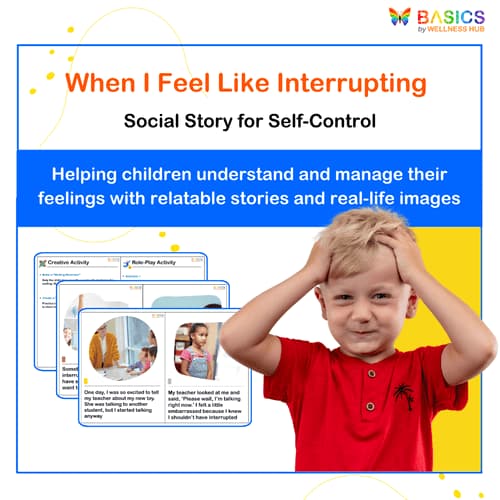
When I Feel Like Interrupting – Social Story for Self-Control
₹ 80.00
₹ 160.00
50% off
4.8 (60 ratings)
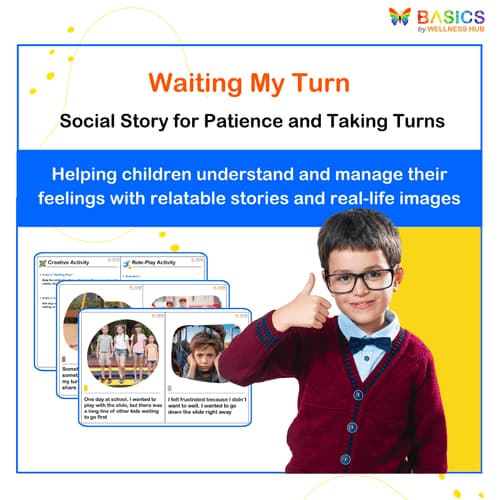
Waiting My Turn – Social Story for Patience and Taking Turns
₹ 80.00
₹ 160.00
50% off
4.7 (56 ratings)
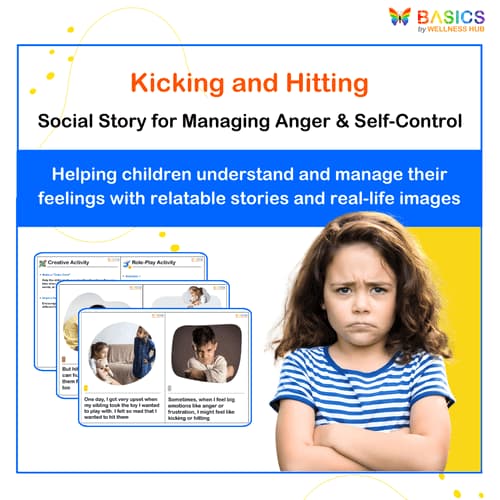
Kicking and Hitting – Social Story for Managing Anger & Self-Control
₹ 80.00
₹ 160.00
50% off
4.6 (52 ratings)
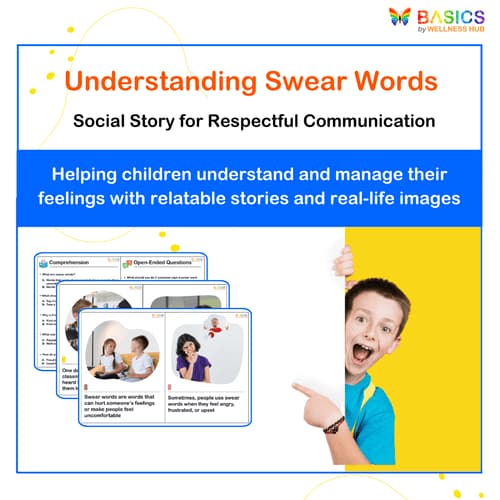
Understanding Swear Words – Social Story for Respectful Communication
₹ 80.00
₹ 160.00
50% off
4.9 (48 ratings)
About the Product
Purpose of Flashcards: The "My Siblings" social story is designed to help children understand and navigate sibling relationships, fostering positive bonds and social skills. Written in first-person perspective, this engaging story allows children to relate to the emotions and scenarios presented. By using real-life images that align closely with each statement, the story builds a sense of continuity and relatability for young readers. Through the story's narrative, children learn about sharing, empathy, and the importance of family connections.
Product Details
Format: 1 PDF
Total Number of Pages: 6 pages
Content: Each page features 2 statements paired with high-quality, real-life images, making a total of 12 statements in the story.
Features: Real images, first-person perspective, designed for young readers.
Educational Benefits
Enhancing Empathy: Helps children recognize and respect their siblings' emotions and perspectives.
Improving Social Skills: Encourages sharing, cooperation, and problem-solving in sibling interactions.
Promoting Positive Communication: Demonstrates ways to express feelings and resolve conflicts with siblings.
Building Emotional Resilience: Guides children on coping with common sibling challenges like jealousy, competition, and misunderstandings.
Instructions for Use
Reading the Story Together: Sit with the child and read the story aloud. Encourage them to engage with the images and connect the statements to their personal experiences with siblings.
Discuss the Scenarios: Pause after each page to discuss the situations presented in the story. Ask questions like, "How would you feel if this happened?" or "What do you do when your sibling needs help?"
Role-Playing Activities: After reading, try simple role-playing exercises based on the story. For example, act out scenarios like sharing a toy or solving a disagreement.
Reinforcing Lessons Daily: Integrate lessons from the story into daily routines. For instance, remind the child of the story when they encounter similar situations with their siblings.
Repeat Reading for Better Understanding: Social stories are most effective when read multiple times. Regularly revisit the story to reinforce the concepts and behaviors.
Activities Using the Resource
Sibling Role-Playing: After reading the social story, engage the children in role-playing activities where they act out scenarios from the story. For example, one child can play the role of asking for help with a task, while the other plays the sibling who offers help. Switch roles to ensure both children experience different perspectives. This activity helps solidify the lessons learned in the story by applying them to real-life situations.
Discussion and Reflection: Hold a discussion session after reading the story. Ask open-ended questions like, “How do you feel when your sibling needs help?” or “What can you do if your sibling is sad?” Encourage the children to share their thoughts and relate the story to their personal experiences. This activity promotes empathy and understanding, strengthening sibling relationships.
Sibling Collage: Create a sibling collage where each child can draw or paste pictures of themselves and their siblings doing activities together. Use the story’s themes as inspiration, such as helping each other or playing together. This activity can be a fun way to reinforce the concepts of teamwork and togetherness.
Story Extension - Create Your Own Sibling Story: Encourage the children to create their own sibling story, using the format of the social story as a guide. They can write about a time they helped their sibling or shared something special with them. This activity helps in developing writing skills while reinforcing positive sibling interactions.
Daily Sibling Challenges: Introduce daily challenges that promote positive sibling behavior, such as "Today’s challenge is to find one way to help your sibling" or "Share a toy with your sibling without being asked." Track their progress and discuss how these challenges made them feel at the end of the week.
FAQs
Q1: What age group is the "My Siblings" social story suitable for?
A1: The social story is designed for children aged 3-7 years. However, it can be used with older children who may benefit from understanding sibling relationships in a simplified, relatable manner.
Q2: How can this story help my child with sibling rivalry?
A2: The story emphasizes empathy, sharing, and communication, which are key to managing sibling rivalry. By relating to the story, children can learn to handle conflicts with their siblings more positively and constructively.
Q3: Can the story be used with only one child?
A3: Yes, the story can be used with a single child. It’s beneficial in preparing an only child for the arrival of a sibling or helping them understand what having a sibling might be like.
Q4: How often should I read the story to my child?
A4: It's recommended to read the story multiple times, especially when the child is dealing with sibling-related issues. Repetition helps reinforce the concepts and encourages the child to apply them in real life.
Q5: What should I do if my child doesn’t seem to relate to the story?
A5: If your child struggles to relate, try discussing their personal experiences with siblings and connect those experiences to the story. You can also modify the story slightly to better fit your child’s specific situation.
Usage Rights and Restrictions
Personal Use: The "My Siblings" social story is intended for personal use by families, educators, and therapists. It may be used in homes, schools, and therapeutic settings.
Sharing: You may share the printed or digital version of this resource with others in your immediate circle (e.g., parents, teachers, caregivers) as long as it’s not for commercial purposes.
Modifications: Users are allowed to adapt or modify the story to better suit their child’s specific needs, as long as these modifications are used privately and not distributed.
Commercial Use: The resource cannot be used for commercial purposes without explicit permission. It cannot be sold, redistributed, or used in any way that would generate profit.
Distribution: You may not distribute copies of this resource, whether modified or unmodified, through any public channels (e.g., websites, social media, or physical copies) without authorization.
Content Alteration: While personal adaptations are allowed, you may not alter the core content of the story for public distribution.
Conclusion
The "My Siblings" social story is an invaluable resource for helping children understand and navigate the dynamics of sibling relationships. Through engaging narratives and real-life images, children can relate to the experiences and emotions portrayed in the story. This resource is designed to be versatile, making it suitable for use in various settings such as homes, classrooms, and therapy sessions. Whether your goal is to ease sibling rivalry, encourage positive interactions, or simply teach the importance of family, this social story offers a supportive, educational tool to help children build stronger bonds with their siblings.



